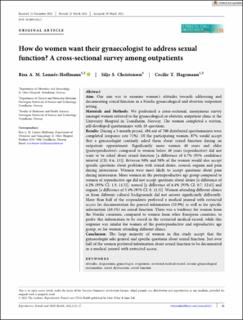| dc.contributor.author | Lonnee-Hoffmann, Risa | |
| dc.contributor.author | Christensen, Silje | |
| dc.contributor.author | Hagemann, Cecilie Therese | |
| dc.date.accessioned | 2023-04-17T06:22:17Z | |
| dc.date.available | 2023-04-17T06:22:17Z | |
| dc.date.created | 2022-05-27T22:25:21Z | |
| dc.date.issued | 2022 | |
| dc.identifier.citation | Reproductive, Female and Child Health. 2022, 1-7. | en_US |
| dc.identifier.issn | 2768-7228 | |
| dc.identifier.uri | https://hdl.handle.net/11250/3063225 | |
| dc.description.abstract | Aim
Our aim was to examine women's attitudes towards addressing and documenting sexual function in a Nordic gynaecological and obstetric outpatient setting.
Materials and Methods
We performed a cross-sectional, anonymous survey amongst women referred to the gynaecological or obstetric outpatient clinic at the University Hospital in Trondheim, Norway. The women completed a written, self-developed questionnaire with 10 questions.
Results
During a 5-month period, 494 out of 700 distributed questionnaires were completed (response rate 71%). Of the participating women, 87% would accept that a gynaecologist routinely asked them about sexual function during an outpatient appointment. Significantly more women 40 years and older (postreproductive), compared to women below 40 years (reproductive) did not want to be asked about sexual function [a difference of 6.7% (95% confidence interval (CI): 0.6, 13)]. Between 90% and 98% of the women would also accept specific questions about problems with sexual desire, arousal, orgasm and pain during intercourse. Women were most likely to accept questions about pain during intercourse. More women in the postreproductive age group compared to women of reproductive age did not accept questions about desire [a difference of 6.2% (95% CI: 1.9, 11.5)], arousal [a difference of 6.4% (95% CI: 0.7, 12.6)] and orgasm [a difference of 5.4% (95% CI: 0, 11.5)]. Women attending different clinics or from different cultural backgrounds did not answer significantly differently. More than half of the respondents preferred a medical journal with restricted access for documentation for general information (52.9%) as well as for specific information (60.1%) on sexual function. There was a tendency for women from the Nordic countries, compared to women from other European countries, to prefer this information to be stored in the restricted medical record, while this response was similar for women of the postreproductive and reproductive age group, or for women attending different clinics.
Conclusion
The large majority of women in this study accept that the gynaecologist asks general and specific questions about sexual function. Just over half of the women preferred information about sexual function to be documented in a medical journal with restricted access. | en_US |
| dc.language.iso | eng | en_US |
| dc.publisher | Wiley | en_US |
| dc.rights | Navngivelse 4.0 Internasjonal | * |
| dc.rights.uri | http://creativecommons.org/licenses/by/4.0/deed.no | * |
| dc.title | How do women want their gynaecologist to address sexual function? A cross-sectional survey among outpatients | en_US |
| dc.title.alternative | How do women want their gynaecologist to address sexual function? A cross-sectional survey among outpatients | en_US |
| dc.type | Peer reviewed | en_US |
| dc.type | Journal article | en_US |
| dc.description.version | publishedVersion | en_US |
| dc.source.pagenumber | 1-7 | en_US |
| dc.source.journal | Reproductive, Female and Child Health | en_US |
| dc.identifier.doi | 10.1002/rfc2.5 | |
| dc.identifier.cristin | 2027829 | |
| cristin.ispublished | true | |
| cristin.fulltext | original | |

